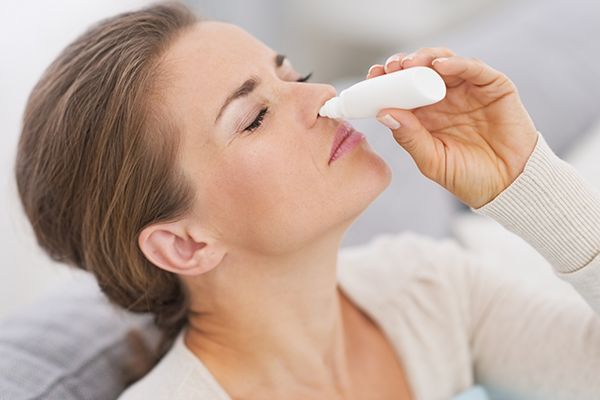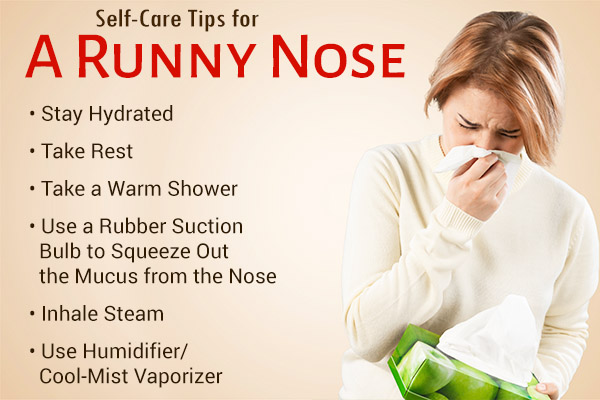In this article:
A runny nose is characterized by excessive discharge or drainage from the nose. This is generally caused by infections or the presence of foreign particles in the nose.

This common problem can be easily managed with home remedies and self-care measures. However, if the condition doesn’t subside in a week, you must consult a doctor.
Home Remedies for a Runny Nose
The following home remedies can help manage a runny nose.
1. Try nasal irrigation
Nasal irrigation using a saline solution and a neti pot can help clear your nasal cavity and sinuses of the excess mucus.
How to use:
Use a neti pot (teapot with a long spout) to pour the solution into one nostril. Allow the solution to run through your nasal cavity and out of the other nostril.
2. Use saline sprays

Use a saline spray as a nasal wash three to four times a day to clear the mucus from your nose. (1)(2)
How to use:
- Use an over-the-counter (OTC) saline spray as directed.
- Make a saline spray at home by mixing ½ teaspoon (3 grams) of salt and a pinch of baking soda in 1 cup (240 mL) of warm water.
3. Consume hot beverages
Drink hot drinks such as soups to get immediate relief from a runny nose and other symptoms of the flu and common cold, such as sore throat, tiredness, chilliness, sneezing, and cough. It can also help ease nasal airflow. (3)
Try herbs in the form of tinctures or teas, such as nettle, yarrow, turmeric, and sage.
4. Apply a warm compress
Applying a warm compress to your forehead and nose multiple times a day helps in subsiding congestion and sinus pressure.
How to use:
Moisten a washcloth with warm water and use it as a compress.
5. Consume a ginger concoction

Ginger is a popular anecdotal remedy. Ginger possesses antibacterial and anti-inflammatory properties that can help relieve cough, runny nose, and nasal congestion. However, this remedy lacks scientific support.
How to use:
- Boil chopped ginger and lemon together.
- Strain the mixture and add 1 teaspoon of honey.
- Drink this concoction three times a day (morning, afternoon, and evening before bedtime) (4)(5)
Caution: Do not give honey to children below 1 year of age. (6)
6. Take OTC medicines
Some OTC medications may be used for children above 4 years of age. These include:
- Nasal steroid sprays
- Antihistamines such as Benadryl and chlorpheniramine
However, the use of such medications is dependent on the cause of the runny nose.
Note: Always consult your doctor before trying OTC medications since they can interact with other medications or produce side effects.
Self-Care Measures for a Runny Nose

The following self-care tips may help alleviate the problem of a runny nose:
- Drink ample amounts of water.
- Rest your body.
- Take a warm shower.
- Use a rubber suction bulb to squeeze out the mucus from the nose of young children.
- Steam inhalation can be helpful for adults and older children.
- Use a cool-mist vaporizer or humidifier to maintain moisture levels indoor.
Preventing a Runny Nose
Avoiding the factors that trigger a runny nose can help in preventing the condition. These triggers include:
- Allergens such as dust, animal dander, pollen, mold
- Irritants such as cigarette smoke and sudden humidity changes
- Close contact with people having upper respiratory tract infections such as a cold
- Excessive use of nasal decongestants, as doing so can aggravate your symptoms
Most-Asked Questions About a Runny Nose

When is a runny nose a cause for concern?
Rhinorrhea, or a runny nose, often resolves on its own. However, if the symptoms persist for long, it may indicate serious conditions such as nasal polyps, cysts, tumors, and choanal atresia.
Consult a medical practitioner at the earliest if the symptoms do not subside in 10 days or are accompanied by a fever.
What is the difference between rhinorrhea and rhinitis?
Rhinorrhea and rhinitis are interchangeably used when referring to a runny nose. However, rhinitis refers to the inflammation of the nasal tissues, which often causes a runny nose.
Rhinorrhea, on the other hand, is the medical term for a runny nose, referring to the discharge of a thin and clear nasal fluid.
Can anxiety cause a runny nose?
A runny nose is usually the effect of an ongoing immune response or the body’s preparation to respond to a pathogen.
Anxiety and long-term stress can impair the immune system, resulting in rhinorrhea. While a runny nose is not a serious concern, it adds to the distress a person undergoes with anxiety.
What is the treatment for a runny nose caused by anxiety?
According to doctors, the treatment for a runny nose caused by anxiety is similar to the treatment for a runny nose from an allergy. Hence, allergy medications or natural remedies such as honey can be used.
However, it is still important to take measures toward reducing your anxiety to manage your rhinorrhea and improve your quality of life as well.
Can antibiotics be used to treat a runny nose?
While green snot can be indicative of a bacterial infection, a runny nose is often a symptom of a common cold caused by rhinoviruses, on which antibiotics have no effect. The doctor may prescribe some other medications to help relieve symptoms such as cough and fever.
Do babies get a runny nose when teething?
A study demonstrated that a runny nose is a common occurrence with teething. Other symptoms, including loss of appetite, rash, increased salivation, irritability, diarrhea, and sleep disturbance, may also be associated with primary tooth eruption. (7)
How can one have a proper sleep when having a runny nose?
A runny nose can interrupt your sleep and thus affect your overall health and mood. To alleviate the problem, it is recommended to use effective treatments at bedtime and correct your posture.
For instance, lying on your back may help subside the problem as the mucus will travel down into your pharynx instead of coming out of the nose.
Final Word
Rhinorrhea, commonly known as a runny nose, results from an irritation or inflammation in the nasal tissues.
While the problem generally resolves on its own, home remedies and self-care measures can help bring quick relief. If the runny nose persists for long, it may be indicative of an underlying problem.

- Was this article helpful?
- YES, THANKS!NOT REALLY


